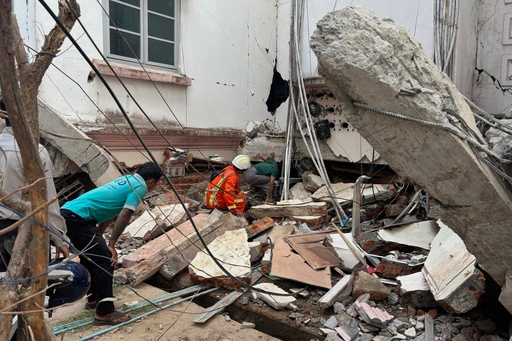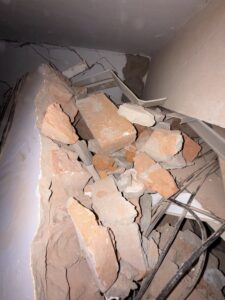
Tragedy has a way of revealing the strength that lies hidden within us. It tests the limits of our endurance, our will to live, and our capacity for hope. On that fateful day when the earth trembled, when buildings crumbled, and when darkness filled the air with dust and despair, a 75-year-old grandmother with heart disease and her two granddaughters, aged 16 and 13, stood against the odds. This is their story—a story of survival, courage, and the unbreakable bond of family.

It was an ordinary day that turned into a nightmare. My wife and son had gone out, leaving my daughters, my mother, and me in our sixth-floor apartment. None of us could have predicted what was about to unfold. When the first tremors struck, the walls of my mother’s room gave way. My daughters, the ones recounting this harrowing tale, were faced with an unimaginable reality—their beloved grandmother was trapped beneath the debris.
In moments of crisis, the mind operates in a paradox of panic and clarity. My daughters knew they had to act swiftly. As the world around them shook, they tried to open the door to their grandmother’s room. It wouldn’t budge. Time was slipping away, and fear was creeping in. Finally, they managed to push the door open, only to be met with a heartbreaking sight—blood streaming down their grandmother’s head. But there was no time to grieve or hesitate; survival demanded action.
Holding onto their grandmother, the three of them attempted to escape. The emergency staircase was their only hope, but in their rush to flee, the unforgiving collapse of the building sent them tumbling down to the depths of the wreckage. In an instant, everything went dark. Dust choked the air. Stones crushed their bodies. Silence replaced the deafening roar of destruction.
Amidst the ruins, my daughters clung to their grandmother. They were together, yet helplessly trapped. The outside world seemed impossibly far away. But my daughters had their phones. Though they could no longer see one another, they could still communicate. They called me, they called for help—anything to break through the suffocating isolation. Hours passed. The weight of uncertainty pressed down on them. My daughters wept, gripping their grandmother’s hands, fearing the worst yet refusing to give up.
In moments of despair, hope flickers in the smallest of ways. My daughters, aware that the end could come at any moment, unlocked their phones, removing all barriers that would prevent rescuers from contacting their parents. If they were to perish, they wanted to ensure that their last messages, their final words, would reach us.
And then, a sound. The distant echoes of rescue workers. A glimmer of salvation in the overwhelming darkness. The pounding of hammers, the muffled voices of those searching for life beneath the rubble. My daughters screamed for help, their voices hoarse from dust and exhaustion. They were answered by a brotherly figure—a rescuer determined to get them out.
One of my daughters, still clutching onto a sense of survival, managed to grab the hammer left behind by a rescuer. She used it to chip away at the debris, creating a small opening, a gateway to life. Through this hole, water was passed to them—small drops of relief in their endless suffering. Their spirits reignited; they were not forgotten. People were fighting for them, just as they were fighting for themselves.
Rescue efforts intensified. The cries from beneath the rubble guided the hands of those above. The moment came when my eldest daughter was pulled out first. She resisted at first, not wanting to leave her sister and grandmother behind. But survival meant trusting the process. She emerged into the open air, her lungs filling with the breath of life once more. The rescue crew wasted no time; they went back for my younger daughter and then, for the most fragile of them all—the grandmother who had endured so much.
Grandmother, weak but unyielding, refused to let go of her granddaughters. Even as exhaustion took over, even as hope flickered like a dying flame, she held on. My daughters fought for her. The rescuers fought for her. A plate blocking her exit was shattered, debris was pushed aside, and after what felt like an eternity, she was freed.
Their ordeal did not end there. The hospital became their next battlefield, a place where their bodies could heal, but where the scars of trauma remained raw. Yet, they survived. And survival, in itself, was a victory.
Through it all, my daughters and my mother displayed a resilience that words cannot fully capture. Theirs was not just a battle against the rubble but against despair itself. They emerged stronger, bound by an experience that would forever shape their lives. They survived because they held onto each other, because they believed, because hope refused to be buried beneath the weight of the ruins.
To those who answered the call for help, who worked tirelessly through the night, who refused to leave until every life was accounted for—our gratitude is endless. The rescue teams, the volunteers, the strangers who became saviors—you were the light in our darkest hour.
In the face of disaster, humanity prevails. And in this tragedy, my daughters and my mother stood as a testament to the unbreakable spirit that defines us all. I bow in gratitude to those who made survival possible, and I pray for the strength to move forward. The ones who least expected to survive have lived to tell their story. And for that, we are forever thankful.
